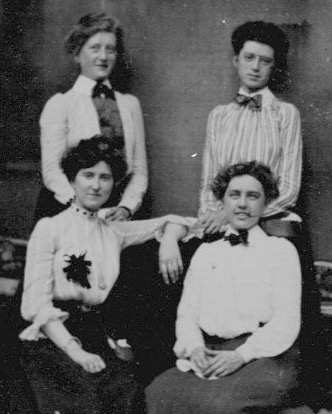I would like to think that all of the really scandalous stories come from the Lardner side of the family. This story describes her family’s connection with the most notorious political crime in the history of New York. Much of it is told in an interview of Martha C. Richards, the great-aunt of the Lardner sisters, and the grandmother of their cousin Carl, who kindly provided me with the transcript.
In the 1890’s, Troy, NY was one of America’s prime industrial centers, and home to a political machine of Irish-Americans bossed by U.S. Senator, Edward Murphy, a former mayor and alderman. The machine maintained its stranglehold on elected office, in part, by paying persons to vote repeatedly. On election day, March 6, 1894, a group of “repeaters”—among them, Bat Shea and John McGough—arrived at a polling place. The Republicans had posted poll watchers, John Boland and Robert and William Ross. They were armed in case there was trouble.
Martha C Richards tells what happened that day: “The house we lived in belonged to Mrs. Rabbitt's father, Galbraith. Election morning Galbraith came over and wanted to know if Dad had voted yet. He said, ‘I thought maybe —‘. Mom said, ‘If you’re thinking of offering him any money, I advise you not to bother’. ‘Oh, I thought, his being sick and all, a little money might come in handy.’ . . . Our house was next to an open lot in old North Fourth Street now Seventh Avenue. John McGough, who lived across the street, went to vote in the little cottage polling place in Orr Street facing the back of our house. . . . On his way to the lot past the fence he said ‘Hello’ to me. . . . He stationed himself near the little house and a fistfight started in the doorway. I later learned it was the Ross boys trying to keep repeaters out. After they fought awhile, McGough shot off a revolver and more shots were fired. . . . [Martha’s sister] Amy was coming home just as the shooting started. Some man grabbed her and kept her out of the way until the shooting let up. . . . Robert Ross was killed and the brother Will injured . . . Men scattered all over the lot . . . and men fell, making it look as though more were being killed. John Boland and another man stood near back of our fence with bricks in hand. . . . A doctor rushed over to the wounded and a small kid yelled ‘What's the use of going over now, the man's dead.’ The doctor turned around and said, ‘Well, the other isn't dead yet.’ . . . It was reported that Boland did the shooting. He was held in jail until proved innocent. When he was let out, his friends paraded up River Street with him. I came out of the laundry just as they were going by. Someone shot off fireworks and I was so scared that I ran back into the laundry. I wanted Mother to hang out a flag to celebrate but she was a friend of McGough's parents and wouldn't hurt them.”
Two days later, the New York Times reported: “With an effrontery which is said to be without parallel even in the most corrupt ward of Troy, Bat Shea went yesterday, after his part in the row which resulted in murder, to the First District of the Thirteenth Ward, where he was allowed to cast one more ballot for the Murphy ticket. He was not arrested until more than three hours after the trouble, and, now that he is locked up, the Murphy officials about the jail are very kind to him.”
Martha C Richards again: “Reddy Dwyer's saloon at North Fourth Street near Douw was the meeting place of the repeaters and they made their plans. M. D. [I don’t know who this is] tried to borrow a gun from [Martha’s brother] Tommy. . . . M. D. and a bunch of friends were going to swear false evidence. He was the first one on the stand. The lawyer confused him so the others backed out. He was put in jail for perjury and his uncle bailed him out. . . . I used to take care of the children belonging to the Minnie Rabbitt woman in whose house the polling was held. She was a Murphyite and when she heard me tell all I had seen she said, ‘You'd better not tell anyone that or they'll have you down in jail.’ . . . John McGough was sentenced for twenty years and Bat Shea was electrocuted. Shea lived on River Street opposite Bond Street. There were wagons of flowers at St. Patrick's Church including an electric chair of flowers.”
Sources:
Interview of Martha C. Richards Kittell by her daughter Marion Kittell Erickson, undated, but approximately 1940; original transcript in the possession of cousin Carl. The interview has been lightly edited for readability.
New York Times, “Citizens of Troy Abused,” March 8, 1894
